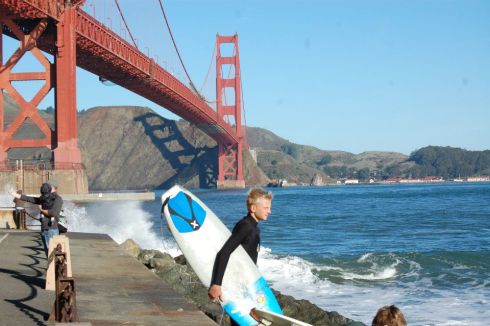This op-ed originally ran in the San Diego Union-Tribune on Feb. 4, 2016.
Each Thanksgiving week, my family and I load up our car with surfboards and drive north along the Pacific Coast Highway to spend the holiday with my brother and his family in San Francisco.
 Heading up that coastal road past emerald coves, perfect waves, elephant seals and sea otters is absolute nirvana.
Heading up that coastal road past emerald coves, perfect waves, elephant seals and sea otters is absolute nirvana.
Our annual family adventure reinvigorates my love and appreciation for what author David Helvarg calls our “Golden Shore,” where “wilderness cliffs and sea cliffs contrast starkly against the dazzling bright silver sea.”
 Growing up in Los Angeles during the 1960s, and Imperial Beach during the 1970s, the son of European immigrants who escaped the horrors of World War II, my family reveled in the freedom of the wide-open and friendly beaches of California.
Growing up in Los Angeles during the 1960s, and Imperial Beach during the 1970s, the son of European immigrants who escaped the horrors of World War II, my family reveled in the freedom of the wide-open and friendly beaches of California.
We took our first camping trips at Carlsbad State Beach, Mission Bay and among the redwoods and wild beaches of Big Sur.
Later, as a college student, I worked as an ocean lifeguard and witnessed firsthand how the 1,100 miles of open, accessible shoreline in California is our great melting pot where we come together as families and friends and share in the moments that create lifelong memories.
Thankfully in 1972, Californians had the foresight to ensure the fundamental right of everyone to access to the coast when they approved the California Coastal Conservation Initiative and the creation of the coastal commission. No other government body in the world plays as important a role in ensuring that every citizen, not just wealthy oceanfront property owners, has access to the beach.
Today, the Coastal Commission helps cities like Imperial Beach plan for the future and prepare for rising seas and a changing climate.
The coastal commissioners who are appointed, and the professional staff that advise them, balance coastal development with the need for clean air and water, wildlife protection and open space for Californians and millions of coastal visitors to picnic, camp, surf and enjoy a great day at the beach.
Dr. Charles Lester currently oversees the commission.
Through his training as a geochemist and attorney and with a doctorate in political science, Lester is uniquely qualified to oversee the protection of California’s coast.
Last year I observed him firsthand at a forum at UC Irvine on the challenge of sea level rise in California. I came away deeply impressed with Lester’s commitment to successful, adaptive and innovative problem solving for the significant and costly issue of coastal erosion.
It was as apparent then, as it is to me now, that Lester has the vision, expertise and leadership skills to guide the commission and our coastline into a climate-challenged 21st century.
Unfortunately, a group of commissioners, largely appointed by Governor Jerry Brown, who originally championed the development of the Coastal Act, are seeking to fire Lester.
These political appointees want to dismantle our strong and independent Coastal Commission, which puts the public good above private profits.
Not only is that bad for our ability to enjoy our coastline, but a threat to transparency, good government and democracy in California.
I hope for the sake of present day Californians who experience the best days of their lives on our shoreline and future generations who have yet to experience the thrill of their first day at the beach, that Governor Brown reigns in the forces that seek to eliminate our access to, and enjoyment of, our “Golden Shore.”
We cannot afford to play politics with California’s fragile coastline, which gives so much enjoyment to so many.
 Note–on February 10, 2016, in an event now called the “Morro Bay Massacre”, Charles Lester was fired in a 7-5 vote of the California Coastal Commission.
Note–on February 10, 2016, in an event now called the “Morro Bay Massacre”, Charles Lester was fired in a 7-5 vote of the California Coastal Commission.



